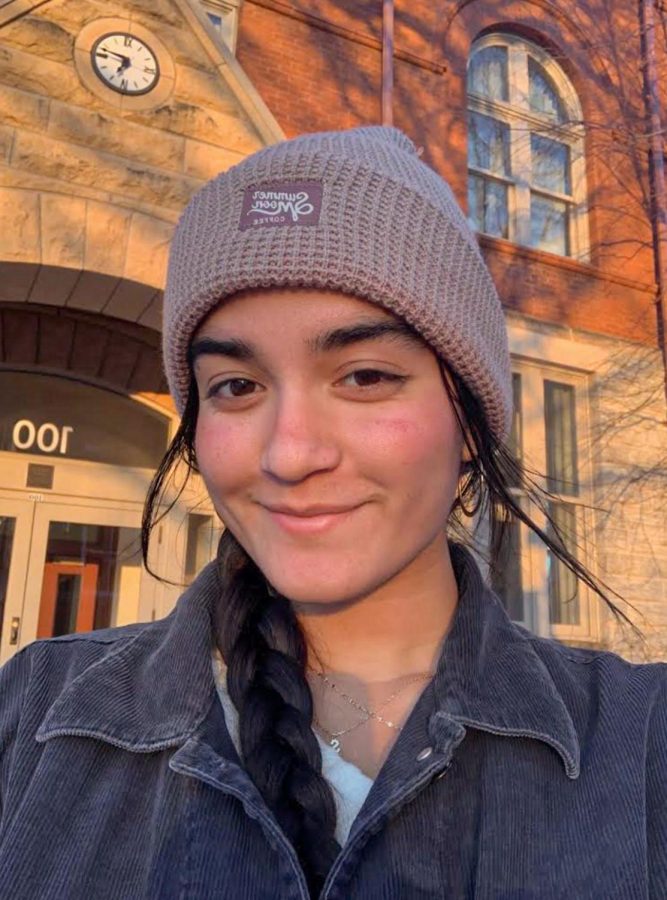MSCG Newly Elected Officials
February 9, 2023
It is clear that Macalester students are vocal about what they want campus life to look like. Despite Macalester being a community full of ideas and solutions for improving the student experience, implementing these ideas requires institutional knowledge of how Macalester’s administration works which most students are not privy to. Recently, Sofia Vaz ’25 and Xiaoping (Eric) Yu ’24 were elected to be Macalester College Student Government’s (MCSG) Community Engagement Officer and the Student Organization Committee (SOC) Chair, respectively, two positions which leverage their access to Macalester’s administration to promote students’ initiatives. Vaz and Yu both have strong visions for how their positions can serve to strike a balance of power between Macalester students and the administration.
Both Yu and Vaz consider student involvement vital to bettering campus life. They have extensive experience with engagement initiatives, with Yu holding the SOC position for the last two years (with a brief study abroad intermission) and Vaz being a member of Program Board (PB). Yu notes that although students are outspoken about their concerns with certain issues on campus, there still needs to be better student representation to mobilize the campus around these concerns.
Acting as a student representative is difficult, and between the extensive time dedicated towards these positions and their labor being unpaid, Yu has found that many students are disincentivized from engaging with campus issues. Vaz has also found that some students find it daunting to engage in uncomfortable conversations about their experiences at Macalester in formal settings.
Accessibility and comfortability are key to encouraging Macalester students to use MCSG as a way to make change on campus. Yu and Vaz emphasized that student government is not a student bureaucracy.
“There’s a power imbalance there, and that’s not the point of student government,” Vaz said. “The point of student government is to build a bridge between administration and the student body.”
Many students find the process of voicing their ideas or concerns to be isolating and intimidating. To rectify this, Vaz wants to implement office hours and social events through which she can act as a liaison between students and those in positions of power. To those on Macalester’s campus, there is a key difference between speaking out at an official forum with student government and having a relaxed conversation with an MCSG member over a plate of food at one of their social events. To Vaz, connecting with Macalester students is simple: students, like everyone, want to have fun and feel comfortable. Making change on one’s college campus should not be excessively formal.
Yu also seeks to push student government down a more casual path. To him, elections and ensuring that student organizations feel comfortable reaching out to MCSG are key to eliminating any perceived hierarchy between student government and students.
“We’re all students at the end of the day,” he said.
Part of making MCSG more accessible also includes riding a wave that is already present. Upon returning from studying abroad, Yu found that student involvement is easier.
“Things are a lot less bureaucratic, which makes things a lot more accessible and easier for students,” Yu said.
Vaz also applauded MCSG president, Bobbie Pennington ’24, for restructuring meetings so that they are less time-consuming and more efficient. Saliently, MCSG is moving in a direction that is less taxing for both students inside and outside of student government, which both Vaz and Yu want to build on.
As a BIPOC woman, Vaz also emphasized that Macalester needs to make space specifically for BIPOC student involvement both off and on campus. Growing up in Minnesota, she did not have a non-white teacher until college. She envisions an initiative in which BIPOC students from surrounding middle and high schools can connect with Macalester students and faculty, in order to provide students an opportunity to see those who look like them in successful positions.
“It’s important for [BIPOC] students to have those spaces to feel safe and like they can express themselves,” Vaz said.
Connections with the Community Engagement Center and the Lealtad-Suzuki Center for Social Justice (formerly the Department of Multicultural Life) are key partners for Vaz to spread her and other BIPOC students’ ideas about how to make Macalester a more equitable campus. Yu highlighted how MCSG is being restructured to foster better connections with on-campus organizations and offices. This includes the proposed creation of a Communications and Engagement Committee, which would increase engagement with campus committees. None of this restructuring has been officially voted on by MCSG. By the nature of their positions, these partnerships with campus offices are essential.
All healthy colleges require active and outspoken students to maintain a democratic community. Through the input of students, Macalester has begun to make space for previously ignored students, consider student concerns and expand its engagement with the community surrounding Macalester’s campus.
As Macalester works towards being a more equitable and involved environment, Yu and Vaz seek to use their position to aid this effort. This can include discussing deep and complex topics that affect Macalester student life, but, as Vaz urges, it can be as simple as putting quesadillas back on meal swipe.













